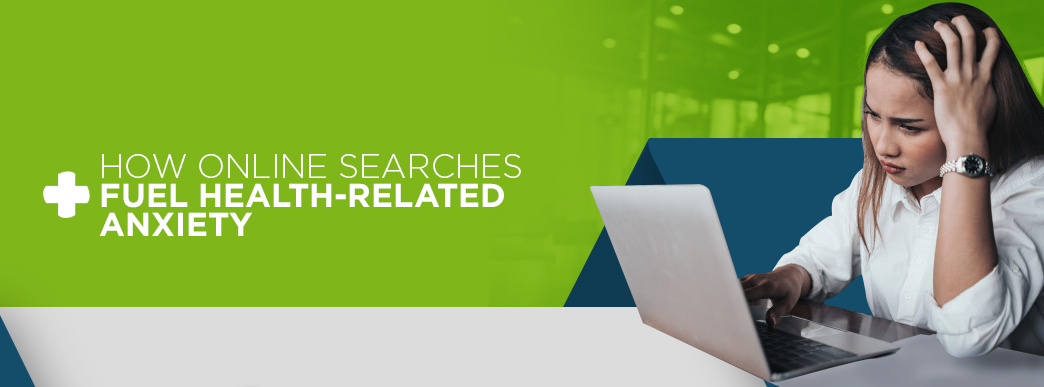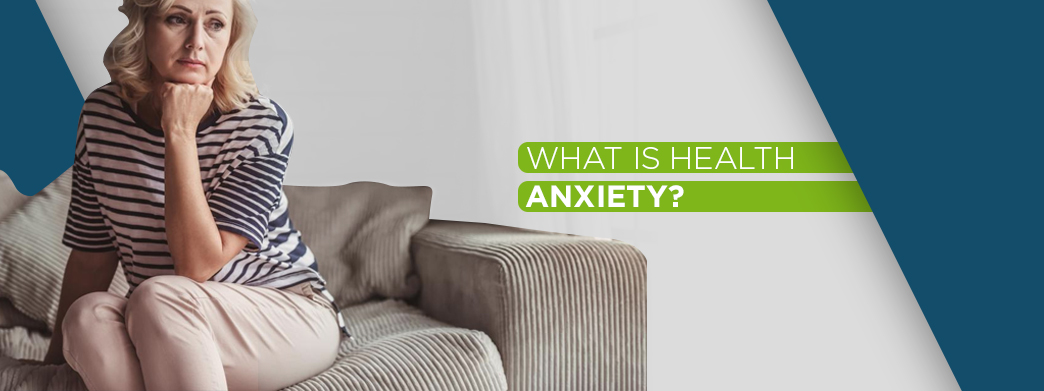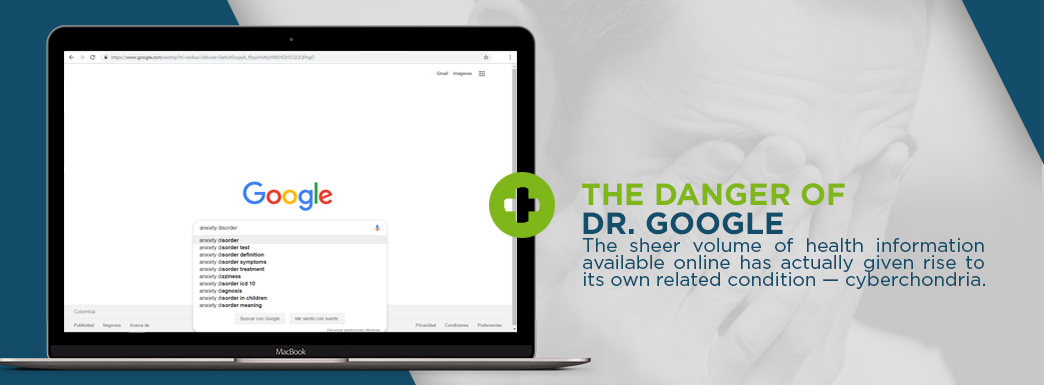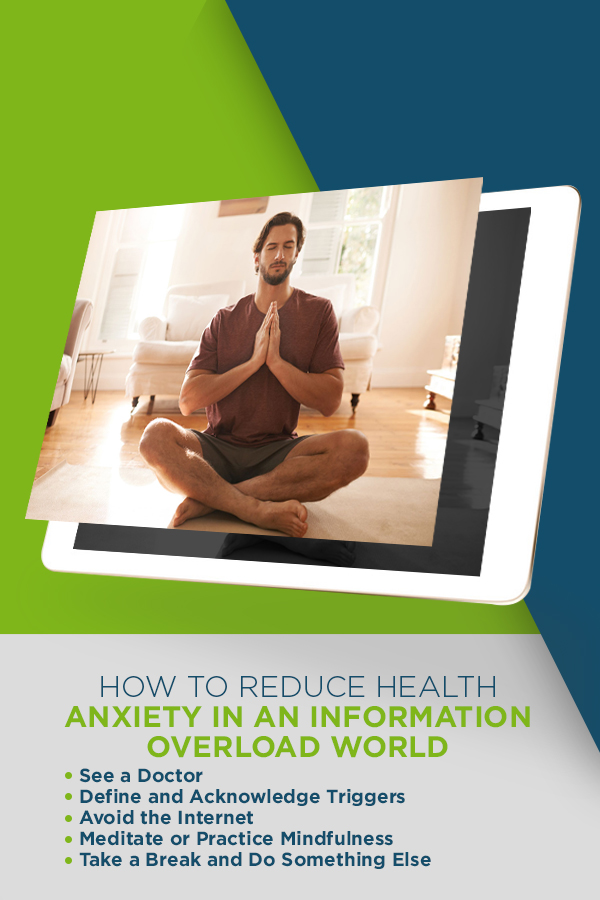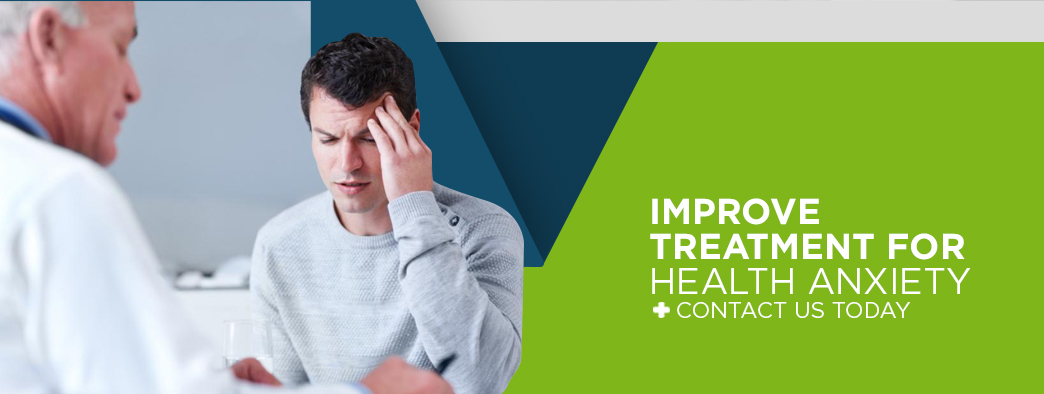How Online Searches Fuel Health-Related Anxiety
Health-related anxiety has struck most of us at one time or another. We’ve all been there — you feel a sudden twinge or brief moment of pain, and your mind is off to the races wondering about all the conditions that could be associated with these symptoms. In many cases, it’s easy to shrug off small symptoms, but sometimes the mind turns into a runaway train envisioning every terrible outcome — even the ones that are downright impossible.
More than two-thirds of people are anxious about their health. When we feel like something is amiss with our health, we usually want answers. In today’s highly-connected world, that often means we choose to “just Google it.” In some cases, a quick web search leads to helpful answers about common symptoms. In others, an unexpected or varied set of results can cause a person to go down the rabbit hole and conclude that every bit of discomfort is the result of a deadly disease.
Although the internet can deliver lightning-fast answers to queries, those answers aren’t always correct. Even when they are, a snippet of a couple of lines shouldn’t be construed as advice or a diagnosis of any kind. Yet, when faced with endless pages of intimidating results, even the most steady person can start to panic. How can we best use the vast amount of information available on the web without allowing it to cause irrational fears about our health? Let’s take a deeper look at online searches and their impact on health anxiety.
Table of Contents
- What Is Health Anxiety?
- What Does Health Anxiety Look Like?
- The Common Face of Health Anxiety
- The Danger of Dr. Google
- When To Seek Treatment For Health Anxiety
- How to Reduce Health Anxiety in an Information-Overload World
There is a difference between a fleeting fear of a more severe condition and true health anxiety. Health anxiety is also known as illness anxiety disorder. As defined by the Diagnostic and Statistical Manual of Mental Disorders (DSM-5), illness anxiety disorder is an obsession with having an illness or believing you might get sick. The condition used to be called hypochondriasis but was changed partially due to the stigmatization of the term “hypochondriac” and to allow for a broader range of symptoms.
The biggest sign that someone is struggling with health anxiety is when their worry about a potential condition is disproportionate to their actual health. They may have minor physical symptoms like the occasional aches and pains, but the central issue is that they’re constantly embroiled in a state of worry over being or getting sick. A diagnosis of illness anxiety disorder depends on the patient showing these symptoms:
- Preoccupation with having or getting a serious disease.
- Minimal or no somatic symptoms.
- High anxiety around health issues.
- Repeated checking of health status or avoidance of doctors and hospitals.
If these health anxiety symptoms persist for six months or more and aren’t explained by depression or other mental disorders, the individual may be diagnosed with illness anxiety disorder. This isn’t to be confused with somatic symptom disorder, in which people with significant somatic symptoms are worried about the symptoms themselves.
What Does Health Anxiety Look Like?
When someone is struggling with health anxiety, they become afraid of minor abnormalities in body function. Most of us don’t fret too much at a runny nose, barely swollen lymph nodes or a minor rash, but for someone with health anxiety, these normal functions can seem like a huge red flag indicating that serious illness is right around the corner.
The more severe a person’s health anxiety, the more normal functions feel like indicators of disease. A slightly elevated heartbeat or unexplained sweating can feel like the beginning of the end, and a person may spend excessive time checking and documenting such occurrences as symptoms of a yet unknown condition. They may also take up new health-centric behaviors like taking vitamins or investigating alternative medicine.
Health anxiety leads people to spend a lot of time talking about illness and avoiding it. The affected person may insist on discussing the minutiae of their health with friends and family, to the point of irritation. However, people with this type of anxiety may also avoid the doctor due to fear that they will find a serious health condition. In some cases, the person finds no relief even through negative results of specific lab tests.
Root causes of health anxiety disorder are unknown, but trauma is one of the usual suspects. People with this disorder may be triggered by seeing someone sick, hearing a news story about a disease or by searching for information on the internet.
The Common Face of Health Anxiety
Illness anxiety disorder affects up to five percent of medical outpatients, making the full-blown version quite rare. For most of us, health anxiety is a passing state in which our minds fixate on the seemingly endless possibilities of acquiring a medical condition.
For the average person, a health anxiety event starts something like this — you feel a sudden pain in between a couple of your ribs. It’s not debilitating, but it’s sharp enough to make you think something might be amiss. Your mind starts going into overdrive, thinking about what organs could be affected and what words you should use to describe the pain. Before you know it, you’re eight pages deep in Google results reading about cardiac and pulmonary diseases without even realizing the pain never actually came back.
The Danger of Dr. Google
The sheer volume of health information available online has actually given rise to its own related condition — cyberchondria. The DSM has yet to list it as an official diagnosis, but it is quite easy to identify. Cyberchondria results in extreme or excessive worry about one’s health through repeated internet searches. The core component of health anxiety is the question “what if.”
Just like anxiety about socializing, work or school, health anxiety is fueled by the number of unknowns in the situation. The worry goes beyond the known possible conditions and imagines the hundreds of unknown diseases that could take hold.
To reduce the element of the unknown, people with and without health anxiety often take to Google. Data from the Pew Research Center indicates that 72 percent of U.S. adults have looked for health information online in the past year, with 35 percent of all adults reporting they have at some point gone online to try and figure out what condition they or someone else have.
Notably, searching for symptoms on the internet doesn’t have the same effect on everyone. Research suggests that online symptom searching is more harmful to those who are prone to general anxiety than to those without anxious tendencies. In other words, someone without anxiety is more likely to find a reasonable, satisfactory answer to their health-related queries and leave the issue alone.
Those with generalized anxiety are more likely to keep searching for further possibilities and find more outlandish ones as they continue, leading to a state of health anxiety. If lengthy web search sessions persist, bouts of health anxiety can easily develop into illness anxiety disorder.
When Health Anxiety Needs Treatment
Some people genuinely can’t tell the difference between being health-conscious and health anxious. However, there are multiple signs to watch out for when identifying chronic health anxiety that needs to be treated. Pay attention to these signs:
- Focusing on specific conditions like cancer or organ failure.
- Spending increasing amounts of time looking up symptoms and conditions.
- Not being able to stop when searching symptoms and conditions.
- Limiting activities due to fear of illness
- Limiting social and family time due to fear of illness
When someone’s fear around health issues results in personality changes, alters a person’s normal habits or starts taking up a significant amount of time, they may need treatment.
How to Reduce Health Anxiety in an Information-Overload World
As a behavioral health professional, you’ve likely seen the effects of health anxiety even if you’re lucky enough not to have experienced it yourself. It’s not always easy to help a patient reduce health anxiety, but sharing the following tips can keep a quick Google search from spiraling out of control.
1. See a Doctor
While a wealth of information is available online, the average person simply doesn’t know what to do with it. The abundance of information may also inflate a person’s sense of their diagnostic skills. In combination with tools like WebMD’s symptom checker that claim to help people identify possible conditions and treatment based on symptoms, internet searches can lead people to believe they can approximate a doctor’s diagnosis.
A 2016 study examined how accurate online symptom checkers are compared to doctors. They gave doctors and symptom checkers the same list of symptoms and determined the rate of accuracy on first-time diagnoses. The algorithm-driven symptom checkers were able to get the right answer on the first try 34 percent of the time. Doctors were able to diagnose correctly 72 percent of the time.
When anxiety strikes, the best thing for your client to do is visit their doctor to get their fears assuaged. If your client rejects medical tests and diagnoses, and their anxiety persists, you may be dealing with a more severe illness anxiety disorder.
2. Define and Acknowledge Triggers
Patients may not always realize what sets off their alarm bells when it comes to health. A patient might come in upset and in panic mode over their health and not know why. The culprit may be something like taking a crowded subway and hearing someone coughing faintly nearby. The patient may not notice, and you can’t know unless you ask the right questions.
Once a trigger has been identified, helping your client deal with it is easier said than done. Health anxiety often feels like a sudden, violent itch that can be challenging not to scratch. Learning how to respond to triggers is a crucial coping skill.
3. Avoid the Internet
Above all, discuss with your patients the dangers of going online immediately after experiencing a health anxiety trigger. The urge to look through every possible symptom and condition combination can be surprisingly powerful and driven by a cyclical structure. Each time someone finds one piece of information, they encounter another question that feels like it must be answered immediately, leading them to the next page and the next.
Help your patient implement a healthy avoidance plan so they don’t fall prey to internet-driven health anxiety at the first sign of any symptom. Whether it’s avoiding their laptop for the first hour after detecting a trigger or going offline for the rest of the day, it’s important for them to have a set time frame in which to calm down and make better decisions regarding symptom searching.
4. Meditate or Practice Mindfulness
Health anxiety makes people feel rattled and sometimes disoriented. The broken thought process that leads a person to scare themselves with symptoms also leads to feeling frantic. If a patient can reduce the effects of panic, they can often enter a more reasonable frame of mind. Meditation and mindfulness have been shown to reduce many of the symptoms that generalized anxiety shares with health anxiety, including hard-to-control worries and poor sleep.
Anxiety of all stripes is marked by difficulty dealing with distracting thoughts. Meditation and mindfulness are both techniques designed to void the mind of thought and encourage engagement with one’s self and immediate surroundings. In some cases, patients may end up going the wrong direction and tune out the surrounding world only to focus in on their perceived symptoms. With adequate coaching, meditation and mindfulness are powerful tools against health anxiety.
5. Take a Break and Do Something Else
Sometimes, the best thing for a patient to do is to take a break and start doing something. Health anxiety driven by internet searches looks a lot like addiction in many ways. Once a person fixates on a symptom, they become obsessed with looking it up even while knowing it will likely lead to negative feelings and outcomes. For the health anxious, “just one search” is equivalent to the alcoholic’s “just one drink.”
Often, the best way to head off a symptom search is to drop the idea and do something different to get in a better head space. Hands-on hobbies are some of the most effective at arresting behaviors associated with health anxiety, as the brain has to focus on coordinating the mind and body.
Improve Treatment for Health Anxiety
Although most of us experience health anxiety to some temporary degree, many people don’t realize that delving deep into the health-related corners of the web is a surefire way to exacerbate the issue. This doesn’t mean that people can’t safely get answers to simple questions, but it does mean that being mindful during those searches is essential. When used judiciously and paired with the input of a doctor, web results can be a powerful health tool.
If you’re working to treat individuals with health or other types of anxiety, you understand the importance of tracking progress through your notes. Of course, that means you’re also familiar with how tedious and time-consuming the note-taking process can be.
ICANotes is an exceptionally robust EHR designed to make behavioral health professionals more efficient and more effective. Register for a free ICANotes trial to see how you can create comprehensive, compliant documentation in just minutes.
Related Posts
How Does Mental Illness Among the Elderly Go Undiagnosed?
How to Make Progress With Your Clients in Their Treatment Plans
How Smartphones Are Changing the Game for Electronic Medical Records
How Tech’s Big 4 Could Impact Healthcare IT Usability
Sources:
- https://www.psychiatry.org/news-room/apa-blogs/apa-blog/2018/08/health-anxiety-fueled-by-online-searching
- https://www.ncbi.nlm.nih.gov/books/NBK519704/table/ch3.t32/
- https://www.merckmanuals.com/professional/psychiatric-disorders/somatic-symptom-and-related-disorders/illness-anxiety-disorder
- https://www.merckmanuals.com/professional/psychiatric-disorders/somatic-symptom-and-related-disorders/somatic-symptom-disorder
- https://www.medicalnewstoday.com/articles/9983.php
- https://www.pewinternet.org/2013/01/15/health-online-2013/
- https://cyberpsychology.eu/article/view/6177/5907
- https://symptoms.webmd.com/default.htm#/info
- https://jamanetwork.com/journals/jamainternalmedicine/article-abstract/2565684

